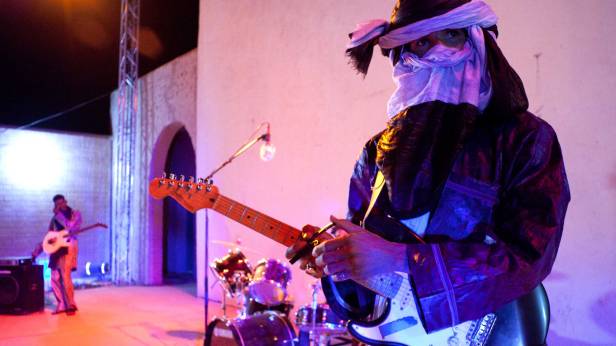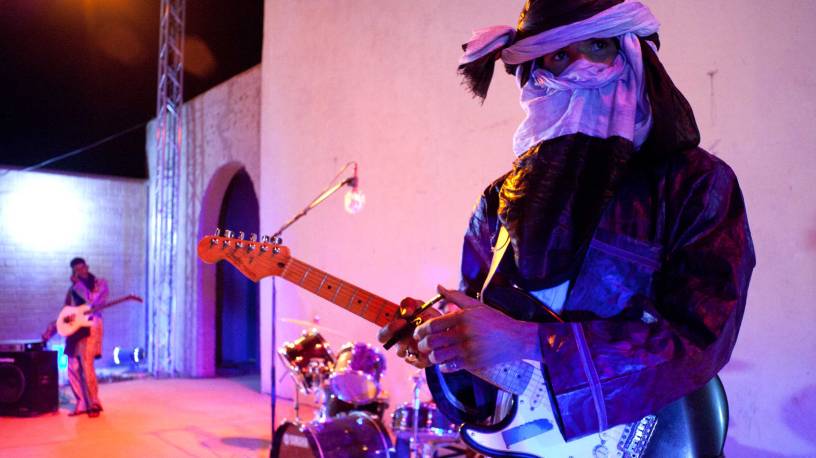
[By Pelu Awofeso]
“Now, we’ll go on stage and make the audience come alive.”
That is Mdou Moctar, the lead character in the musical film “Akounak Tedalat Taha tazoughi” (Rain, the Colour of Blue with a Little Red in It), inspiring members of his Azawair band moments before they’ll climb the stage to perform at a long awaited talent-hunt competition in Agadez (Niger Republic).
They’ve spent several weeks rehearsing ahead of the big night and all they could do now is hope that their efforts will win the day. It is the sort of competition that could take whoever emerges the winner from spartan obscurity to in-demand celebrity status in a city swarming with skilled guitarists and gifted musicians.
A translation in the film’s trailer describes Agadez as a place “where the guitar is king”.
The atmosphere inside the arena is tense. The audience is pumped up and almost everyone in the hall has a phone at the ready to record the performances.
But the road to this fateful evening has been paved with unimaginable misery for Mdou, a guitarist in real life (The film is partly reflective of his real life challenges): having only just moved to Agadez—from Libya and Algeria—with his parents, he roams the city seeking opportunities to showcase his skills with the guitar and earn his keep.
He is also looking out to find kindred spirits with who he can hold jam sessions. But being left handed, most of the guitars he comes across at gatherings are right-handed. Every once in a while someone offers to re-configure one so he can have a go at it.
At home he not only hides his guitar from view, but also plays it discreetly—in one scene, he turns up the volume of the radio quite loud so that it swallows the sounds from the Fender—because his father is opposed to his musical aspirations; the older Moctar fears his son would end up being a drug addict, if not worse. One day, discovering where his son’s shiny guitar is hidden, he sets it alight.
“You shouldn’t have done that,” Mdou cries over and over in a heated confrontation with his dad, helplessly watching as what remains of the guitar burns. He storms out of the compound into the night, his spirits as crushed as the guitar and his hopes of succeeding as a guitarist with it.
Mdou eventually makes friends and he is invited to join a band as word spreads around town about the approaching competition. By that time, he has played at a couple of weddings parties, winning new fans—and the affection of a local beauty. Some of the local guitarists grow uncomfortable with his rising popularity, fearing he might overshadow them and win the competition.
“A stranger can’t come to our town and dominate us,” they rant and soon a plot is hatched for something terrible to happen to the purple man, who also has to deal with the turmoil of losing his girlfriend, who is not only supportive but gifts Mdou with a new guitar.
All of the drama unfolds with the desert landscape and rustic setting of Agadez in the background, complemented by soulful soundtracks.
Within a few minutes of the film starting, I notice that Mdou wears purple turban and dress, which strikes me as an unusual colour for a guy. The bodies of his motorcycles and guitar are also purple.
It becomes clear why. To explore the Tuareg guitar scene, and to create a work “that could resonate with local audiences, they could participate in and be proud of”, American Director Christopher Kirkley travelled back in time for inspiration.
“I went to what was familiar to me—the Western musical film, idealized by 1984’s Purple Rain,” Kirkley says in an interview published in the programme booklet of the 6th Lights Camera Africa Film Festival, which held in Lagos in October. “It’s a landmark film that set the tone…it’s the perfect universal story, and became the template for our film.”
Mdou steps on stage with his band, just after their most formidable rival Kader and his band had thrilled the audience with Moctar’s original composition stolen in the days before the competition. Distressed, Mdou finds redemption and a secret weapon is a song—Adounia (Life)—developed from a long forgotten lyric penned by his dad while a struggling artiste, before he abandoned the venture altogether.
Akounak is a no-frills, heartwarming portrayal of everyday Toureg life as lived by its masses. After watching it, I now want to listen more to more guitar-based music of the Sahel.
